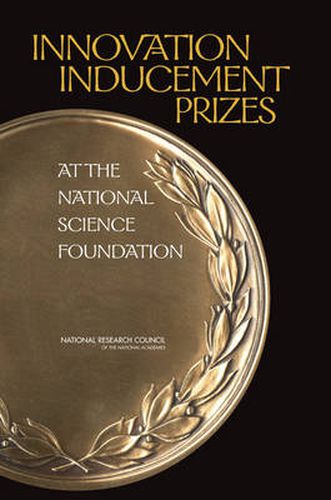Readings Newsletter
Become a Readings Member to make your shopping experience even easier.
Sign in or sign up for free!
You’re not far away from qualifying for FREE standard shipping within Australia
You’ve qualified for FREE standard shipping within Australia
The cart is loading…






Following a congressional directive in its FY 2006 Appropriations Act, the National Science Foundation asked the STEP Board to propose a plan for administering prizes to individuals or teams that achieve novel solutions to specified social or research needs or capitalize on recognized research opportunities. A committee under the STEP Board concluded that an ambitious program of innovation inducement prize contests would be a sound investment in strengthening the infrastructure for U.S. innovation and that NSF, although inexperienced, is well suited to designing an experimental program that could add substantially to understanding regarding the appropriate goals of such contests, the motivations of participants and sponsors, and the rules and conditions that contribute to successful contests. The committee recommends that NSF start off with a series of small-scale prizes ($200K - $2M) in diverse areas while beginning to plan for much more ambitious contests ($3M-$30M) that would address significant economic or social challenges and be conducted over several years. The report addresses many of the generic issues that arise in administering innovation prize contests (types of contests, eligibility to participate, disposition of intellectual property rights, and decisions regarding awards) and explores 7 research and technology fields that might lend themselves to prize contests.
$9.00 standard shipping within Australia
FREE standard shipping within Australia for orders over $100.00
Express & International shipping calculated at checkout
Following a congressional directive in its FY 2006 Appropriations Act, the National Science Foundation asked the STEP Board to propose a plan for administering prizes to individuals or teams that achieve novel solutions to specified social or research needs or capitalize on recognized research opportunities. A committee under the STEP Board concluded that an ambitious program of innovation inducement prize contests would be a sound investment in strengthening the infrastructure for U.S. innovation and that NSF, although inexperienced, is well suited to designing an experimental program that could add substantially to understanding regarding the appropriate goals of such contests, the motivations of participants and sponsors, and the rules and conditions that contribute to successful contests. The committee recommends that NSF start off with a series of small-scale prizes ($200K - $2M) in diverse areas while beginning to plan for much more ambitious contests ($3M-$30M) that would address significant economic or social challenges and be conducted over several years. The report addresses many of the generic issues that arise in administering innovation prize contests (types of contests, eligibility to participate, disposition of intellectual property rights, and decisions regarding awards) and explores 7 research and technology fields that might lend themselves to prize contests.